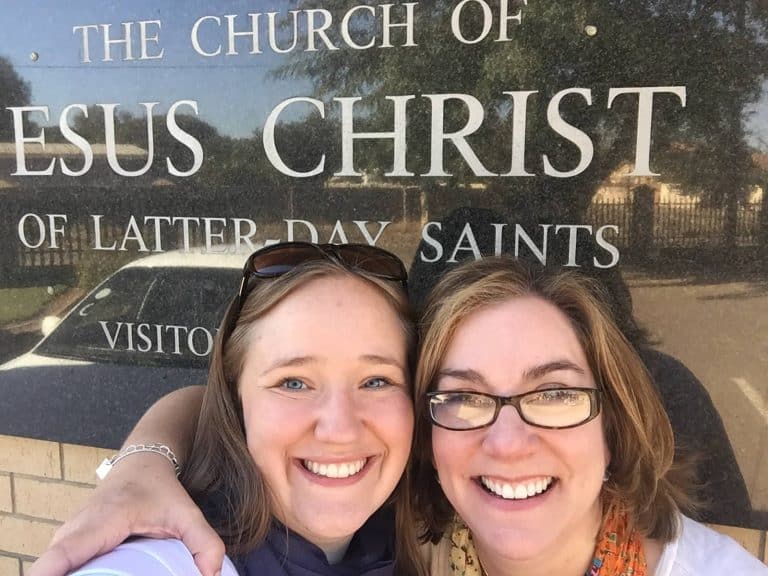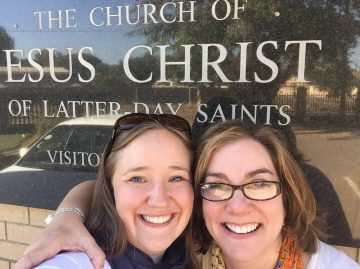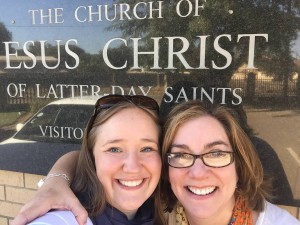I recently returned from a trip to Botswana, where I joined a group of scholars (including three other Exponent bloggers!) in collecting oral histories from women of faith from several different faith backgrounds, including Mormonism. As a group, we were able to talk to dozens of women and hear about their struggles, successes, hopes, fears, and how their faith informs their choices and the lives that they live. As I talked to these women (and particularly Mormon women), I admit being surprised by their answers, because they didn’t always reflect my biases. As African women, shouldn’t they resent the church’s priesthood/temple ban that wasn’t lifted until 1978? As most women I talked to were working women, shouldn’t they resist or resent the church’s culture/teachings about mothers staying home with their children? Shouldn’t they find great joy in Relief Society as a way to bind women together and promote sisterhood?
Over and over again, I was reminded that my story is not their story, and really, even their story isn’t their story. The women I interviewed were so completely unique – none of their stories matched up to my expectations, and none of them even matched up to each other. I kept expecting to find a theme – I wanted to be able to walk out of 5 or 6 interviews with a clear picture of what Batswana Mormon women think and feel. But what I found is that their faith and their lives are as varied and multifaceted as any other group of Mormon women.
Chimamanda Ngozi Adichie, a Nigerian author, speaks about the danger of this “single story” in her TED talk (embedded below). She says, “The single story creates stereotypes, and the problem with stereotypes is not that they are untrue, but that they are incomplete. They make one story become the only story.” When we expect a single story from a person or group of people, we don’t allow for nuance, complexity, or the possibility “to connect as human equals.”
Over and over again, I was reminded that the stories of Batswana women are as diverse as the stories of Mormon women generally – how many times have we seen Mormon women painted with a single brush? “Mormon women are oppressed,” “Mormon women are polygamous,” “Mormon women are conservative,” or “Mormon women just do what they’re told.” But when we talk to Mormon women themselves, we see that the stories and lives are much more beautiful, nuanced, and complex than we even realize. In conjunction with my work with the Mormon Women’s Oral History Project, I have interviewed dozens of Mormon women in the past few years, and I can tell you that none of the stories I’ve heard are as simple as expected.
After finishing up an interview with an LDS woman, she turned to me and said, “I feel so empowered telling my own story, rather than having somebody else tell it about me.” I was so struck by this (particularly because our group had just been discussing the empowering nature of narrative just a couple of days before). What stories would I have told about Batswana Mormon women, even after this trip? How would I have lumped them together as a group, painting a generalized portrait instead of a rich tapestry of individual experiences? Yet instead of coming home with my own conclusions and generalizations about women in Botswana, we came home with rich oral histories in these women’s own words. Instead of us telling their story, they are telling it to us, and it’s so powerful (both to those listening as well as those telling).
To again quote Chimamanda Adichie, “Many stories matter. Stories have been used to dispossess and to malign. But stories can also be used to empower, and to humanize. Stories can break the dignity of a people. But stories can also repair that broken dignity.” It’s so critical that we both listen to as many stories as we can, but also to tell our own. What story will people tell about you if you don’t tell it yourself?





6 Responses
[…] “Many stories matter.” […]
Liz–you capture beautifully what we experienced. Thank you!
Liz–Great post! I am so glad that you, Heather, Caroline and others were there to be the ones collecting these stories! You are my hero! (Now, can you just move back here to my ward?!)
Yes! It sounds like you truly had an international Mormon experience! Well done!! I’ve been saying the same thing for a long time, but I don’t think people understood it. I really would love the Exponent to take the next step and allow for contribution of the stories of non-North American women in a better-rounded light, here’s to hoping this experience will have a domino effect in that direction!
This is fantastic. I’ve been thinking a lot about this lately because my post on Friday is going to be about the same topic of stories. I love your thoughts on it and especially your perspective coming from Africa. What am amazing experience to be able to listen to all those stories from the women you met. I hope we get to hear some of those stories too.
Love your thoughts about how we stereotype when we have only heard one story.